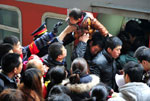Regulating official cars
Updated: 2012-02-09 08:11
(China Daily)
|
|||||||||||
Government agencies have been encouraged to stop using official vehicles one day a week based on their license plate numbers, according to a notification for an energy-saving and emissions reduction program to be implemented across the country.
Limiting private vehicle use according to plate numbers is a measure already introduced for private vehicles in some big cities in a bid to ease traffic congestion.
The new program, part of government efforts to protect the environment and promote sustainable development, includes official vehicles in traffic-control measures for the first time.
The measure clearly signals that official vehicles do not have a higher status than private vehicles on the road, and is a timely correction of the entrenched impression that official vehicles enjoy privileges over private vehicles.
The action is also welcome as it will bring tangible emission cuts. There are a huge number of official vehicles on the roads, even if the exact number is still unknown.
The government is encouraging all civil servants to walk, ride bikes and use public transport according to the distance from their residences to their offices. By so doing officials will set a good example for citizens and help promote more environmentally friendly commuting.
But this program is far from enough. It should be enforced rather than merely encouraged. Easing officials' reliance on official vehicles is a necessary preparation for official vehicle reform in the future.
The government should draft and implement relevant regulations to strictly control the number of official vehicles. Otherwise users of official vehicles can simply buy more vehicles in order to dodge the restriction. Some families in Beijing, for example, purchase a second car so they can drive on days when they are restricted from using the first.
Since it is currently difficult to differentiate official vehicles from private vehicles, the administration of official vehicles urgently needs to standardize and unify distinguishing signs for these cars purchased and run with taxpayers' money.
The enforcement agencies should also be empowered to monitor and punish those using official vehicles that break the rules.
Only when all these supporting rules and measures are made and enforced, can the proposal fulfill its purpose.
(China Daily 02/09/2012 page8)




